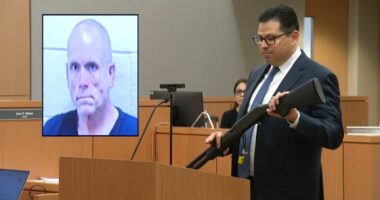Share this @internewscast.com
Left inset: U.S. District Judge Sara Ellis pictured during a nomination hearing on June 19, 2013 (Senate Judiciary Committee). Right: Chief Patrol Agent Gregory Bovino defends uses of force in local news interview (CBS News Chicago).
The Trump administration’s urgent appeal for an “extraordinary” writ to nullify a federal judge’s directive was swiftly acknowledged by a federal appeals court in Illinois, which temporarily blocked the order. This move potentially set the stage for a judicial reprimand. The directive in question required a U.S. Customs and Border Protection (CBP) official to present daily in-person court updates regarding “use of force activities.”
U.S. District Judge Sara Ellis, from the Northern District of Illinois, stirred significant attention on Tuesday when she mandated that Chief Patrol Agent Gregory Bovino must appear in court daily at 5:45 p.m. to report on these activities. Her decision was part of a civil lawsuit concerning “Operation Midway Blitz.” The lawsuit claims federal agents displayed “brutality” on the streets of Chicago to suppress the First Amendment rights of the press, elected officials, religious leaders, and civilians during peaceful protests outside the Broadview ICE facility and other locations.
Following Tuesday’s hearing, Ellis issued several directives, including that agents must have clear identifiers on their uniforms and wear body cameras. Additionally, she demanded daily updates from Bovino, who was under scrutiny after an Oct. 23 video surfaced showing him deploying tear gas into a crowd, seemingly in defiance of a temporary restraining order (TRO) that limited excessive “crowd-control” force.
The Department of Justice (DOJ) reacted on Wednesday, urging the 7th Circuit U.S. Court of Appeals to issue an immediate stay. The government argued in a statement that Ellis’ “extraordinary and extraordinarily burdensome” order was imposed “without any formal finding that the government failed to comply with prior court orders,” labeling it a “clear abuse of discretion” and a violation of the “separation of powers.”
The DOJ further asserted that the “unprecedented order” impedes Chief Bovino’s ability to fulfill his duties, is unnecessary for ensuring compliance with the TRO, and bears no relevance to the claims and allegations presented in the lawsuit.
“That unprecedented order,” the DOJ said, “interferes with Chief Bovino’s ability to undertake his responsibilities, is unnecessary to secure compliance with the TRO, and is completely untethered to the claims and allegations underlying this lawsuit.”
“Requiring a senior executive official to appear for daily questioning far exceeds the recognized bounds of discovery. The order significantly interferes with the quintessentially executive function of ensuring the Nation’s immigration laws are properly enforced by waylaying a senior executive official critical to that mission,” the Trump administration continued. “And the order only underscores the extent to which the court has exceeded its judicial role by implementing vastly overbroad relief and arrogating to itself the role of supervising and micromanaging the day-to-day operations of Executive Branch law-enforcement agencies.”
The 7th Circuit acted accordingly and swiftly issued an administrative stay of Ellis’ order — specifically taking Bovino off the hook for now as far as the daily in-person updates are concerned — as the appellate court weighs whether to grant the Trump administration’s request for “extraordinary” relief in the form of a writ of mandamus.
If mandamus follows, Ellis, a Barack Obama appointee, would be forced to vacate her own order for having been a “clear abuse of discretion” or “judicial usurpation.”
“Pending a decision on the petition for a writ of mandamus, the district court’s October 28, 2025 order is temporarily stayed only to the extent it required Gregory Bovino to appear in court, in person, each weekday at 5:45 PM,” read the order, signed by no particular circuit judge. “It is further ordered that plaintiffs shall respond to the petition by 5:00 pm on October 30, 2025.”














